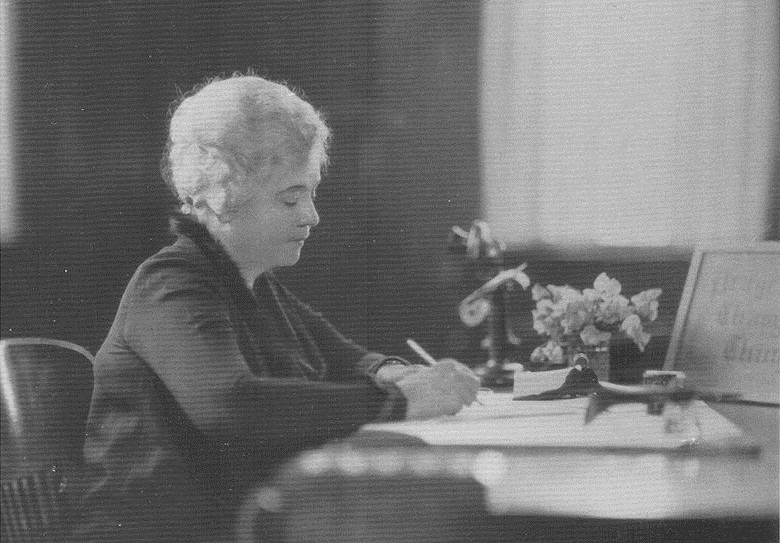<Back to Index>
- Educator Martha McChesney Berry, 1865
- Composer William Billings, 1746
- King of Montenegro Nikola I Mirkov Petrović-Njegoš, 1841
PAGE SPONSOR

Martha McChesney Berry (7 October 1865 – 27 February 1942) was a United States educator and the founder of Berry College in Rome, Georgia.
Martha McChesney Berry was the daughter of Capt. Thomas Berry, a veteran of the Mexican - American War and American Civil War, and Frances Margaret Rhea, a daughter of an Alabama planter. Berry was born on October 7, 1866, in Berry Cove in Jackson County, Alabama, but her family relocated to Rome, Georgia, when she was an infant. Thomas Berry was a partner in Berrys and Company, a wholesale grocery and cotton brokerage business in Rome. In 1871, he purchased Oak Hill, a 116 acre (0.47 km2) working farm on the Oostanaula River approximately one and a half miles north of Rome. Miss Berry grew up in this home, along with her five sisters, two brothers and three orphaned cousins. Her early education was conducted through private tutors, and she attended the Edgeworth School, a finishing school in Baltimore, Maryland. This was the only formal education she received. Martha Berry lived at Oak Hill for the remainder of her life.
The founding of the Berry Schools was inspired by Berry’s desire to help the children of poor landowners and tenant farmers in Georgia, who did not have access to quality education. As a consequence of this desire, Martha Berry never married and devoted her life to developing the schools that would eventually become Berry College. In the late 1890s, she constructed a small whitewashed school on eighty-three acres of land given to her by her father and began to teach Sunday school classes to local children. She also taught in an abandoned church at Possum Trot, which still stands on the Berry College campus. The Sunday school classes eventually turned into day school activities and Berry opened a boarding facility for boys called Boys’ Industrial School on January 13, 1902. At the time, she had only five boarders but the need was apparent and in 1909 she opened the Martha Berry School for Girls. Both schools offered high school level education and were open to those willing to study hard and work for the school. Her teachings focused on the hands, head and hearts of her students: The ability to learn, work and the will to do both well. Her motto was and still is the motto of the college, “Not to be ministered unto but to minister.” In 1926, she established Berry Junior College, which in 1930 expanded into a four-year school. Martha Berry died in 1942 and the schools were faced with several years of transition. The Martha Berry School for Girls closed at the end of the 1955 - 1956 academic year. The boys’ high school was renamed Mount Berry School for Boys and in 1962 it became Berry Academy, which closed in 1983. The college continues to provide a highly ranked educational experience coupled with worthwhile campus work opportunities.
Martha Berry had many supporters during her lifetime, such as Theodore Roosevelt, Andrew Carnegie, Ellen Louise Axson Wilson (wife of President Woodrow Wilson) and Henry Ford. Henry Ford was a generous benefactor to the schools and provided the funds necessary to build the “castle” like dorm complex at the college. The dorms are named after his wife and mother, Clara and Mary.
Martha Berry is the subject of several biographies: Martha Berry the Sunday Lady of Possum Trot by Tracy Byers and Miracle in the Mountains, by Harnett Thomas Kane and Inez Henry. Also of note is Berry College A History: The Legacy of Martha Berry by Ouida Dickey and Doyle Mathis. A well rounded biography of the late Martha Berry can also be found in Evelyn Hoge Pendley's A Lady I Loved. Tracy Byers' writing is a little over-dramatic and isn't typically viewed in most circles as being historically accurate. While many of the stories he recounted may be true, as is the case with a few of the stories from Martha Berry, they are probably dramatized for story telling purposes.
Some sources argue that Martha Berry is responsible for many similar work - study programs grounded in Christian faith that developed around the re-constructed South. While her broader impact is questionable given that her school structure was popular for the day, there is no doubt that Miss Berry was able to put her unique touch on the school through her prolific maxims that she had taught throughout the school like, "prayer changes things."
One myth that still persists is that Martha Berry had a fair amount of gold that she had hoarded during the early twenties and buried it on Berry College's land.